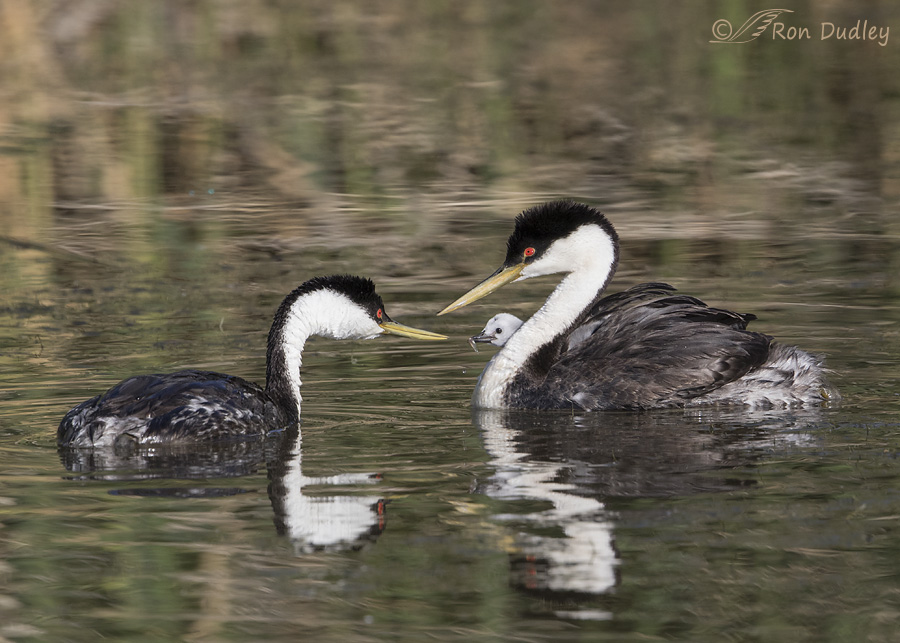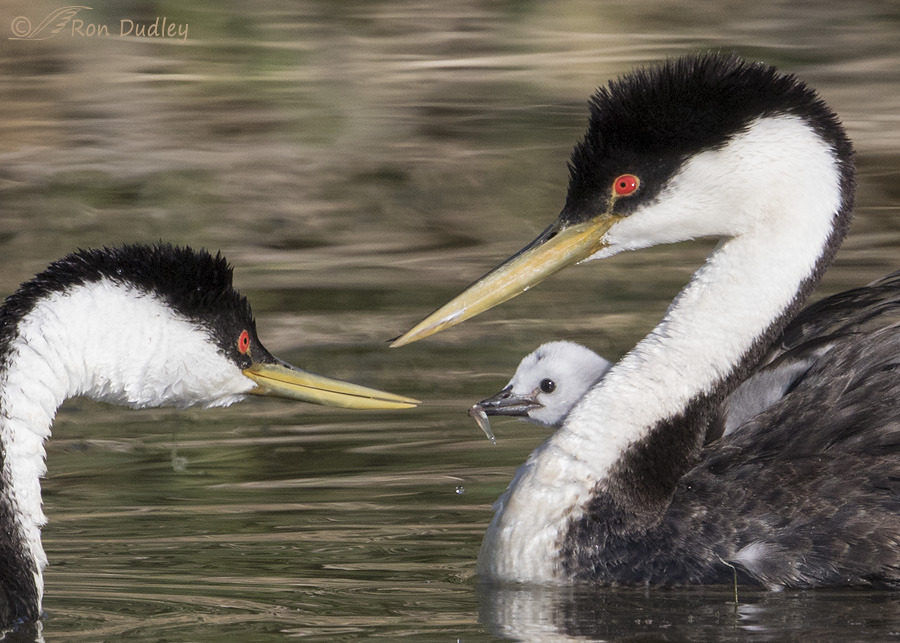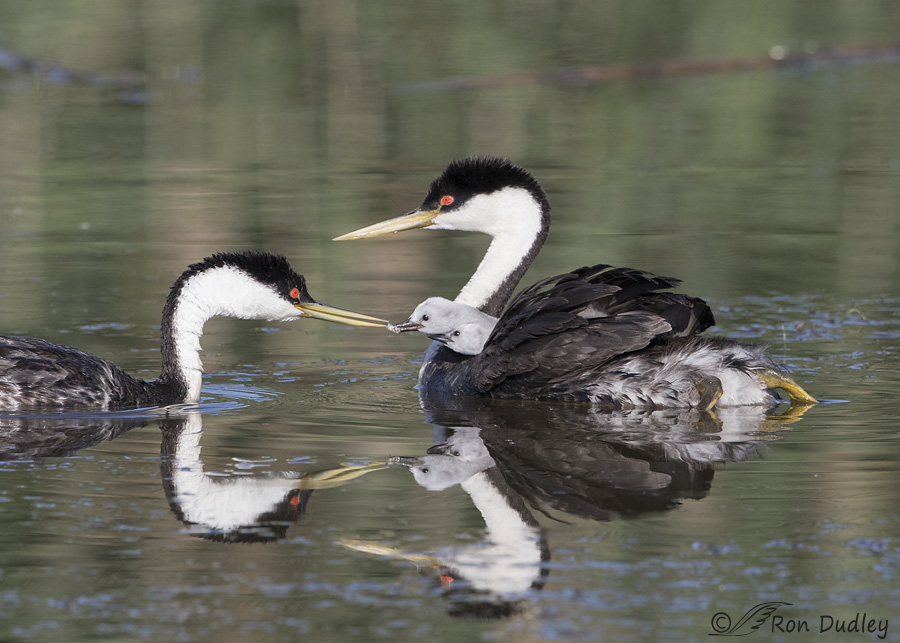It’s a never-ending job for adult Western Grebes as they try to keep their chicks fed while back-brooding them at the same time.

1/2000, f/7.1, ISO 500, Canon 7D Mark II, Canon EF 500mm f/4L IS II USM + 1.4 tc, not baited, set up or called in
I photographed this family eleven days ago at Bear River Migratory Bird Refuge. Here the female on the left has just delivered a small fish to a chick on the back of the male. The food is always delivered and swallowed whole (rather than torn apart first) so when the chicks are small like this they start out with very small food items – usually fish but also some insect larvae.

A large crop of the previous image provides a more intimate look at the feeding process and allows us to confirm that the food item really was a tiny fish.

1/2000, f/7.1, ISO 500, Canon 7D Mark II, Canon EF 500mm f/4L IS II USM + 1.4 tc, not baited, set up or called in
But these adults had more than one chick to feed – there was a second youngster hidden on the back of the male. Three minutes later this second food item was delivered but these feeding trips can occur as often as one or more trips per minute. When the back-brooding parent tires of babysitting it rises up in the water and flaps its wings which dumps the chicks into the drink. They then quickly climb up on the back of the other parent and the roles of the adults have been reversed.
It’s a lot of work keeping those fast-growing youngsters fed.
Western Grebes are sexually dimorphic so adults can be reliably sexed in the field. Compared to the male the bill of the female (on the left in both images above) is shorter and much thinner and the curvature of the mandible gives her bill a somewhat upturned appearance that is lacking in the male.
The female is also smaller than the male but that size difference typically isn’t useful in sexing them unless both sexes are seen together.
Ron


Sensationall Ron
Charlotte Norton
Thanks, Charlotte.
Wonderful photos…an extension of the photo I purchased from you. Why are the photos posted electronically so much brighter and vivid than the print?
Elizabeth
I guess it must be a function of the brightness of the screen you’re looking at, Elizabeth, but they shouldn’t look much different.
Are you dissatisfied with your print?
Just wishing it were as bright as it appeared on screen, but the image is lovely and I have had it framed.
Education, beauty and delight. Again. Thank you.
I’m glad you enjoyed it EC. Thanks.
Not only superb photographs (and it’s your fault for spoiling us to expect nothing less!), but a wonderful study in behavior and field identification. It’s hard to conceive how much energy the parents expend to ensure the survival of their chicks, and ultimately, of the species.
Thank you, Ron! Very nice work.
Thanks very much, Wally.
Beautiful family portrait. I was hoping to go to BRMBR today for the sunset, between the clouds and smokey air it should be spectacular. Yesterday’s adventure to the Spiral Jetty included a pelican rescue which left me lame so I’m home bound with ice packs. Maybe next week. I will savor your posts meanwhile.
I’ve never done it, April, but I’ve heard from those in the know that wrestling with pelicans can be a bruising experience. I hope you heal up quickly!
Thanks, the pelican was very dehydrated and salt encrusted. It did not put up much of a fight. Carrying it 1 mile to the car was hard, they are heavy. What got my knee was rolling on a rock and falling with pelican in arm on the last incline to my car. The pelican is doing well though so it was worth the effort.
Thank you, April, for your kind heart, expertise and determination. Your lumps and bumps, bruises and sore muscles are badges of honor…
And April, I’ll bet you fell in a way that didn’t hurt the pelican. Yeah, I know that fall. Bless you and I hope your knee is feeling better by now.
When I looked at the bill of the female in the second shot, I thought ” She almost looks as if she’s smiling “–then immediately thought ” anthropomorphizing”
again—I’m glad you pointed out that there is actually a difference between the males’ and females’ bill shape….not my imagination !
Nope, not your imagination, Kris. There’s a difference not only in shape but in size too.
Another great series, Ron!! I just love these Western Grebes and what wonderful parents they are. I’m glad you did the crop so we could get a good look at the little one getting his fish. Wish all our Human parents could be as good at parenting as so many of our wild Birds are!!
Thank you, Jo Ann.
Gorgeous shots of beautiful birds! Since I’ve lived more inland, I’ve concentrated so much more on raptors and other non-water birds, so it’s a delight to learn more about these guys. And I continuously enjoy watching different species parent. Life on this spinning rock is so universal, isn’t it?
You should move to Utah where you get it all!
Last I heard Laura’s considering exactly that, April.
Great sequence, Ron – all parents have their work cut out for them! Is cute to see them peeking out from under the parents feathers. Imagine it takes LOTS of small bits of whatever to keep them fed!
It does, Judy. It’s amazing how much the youngsters can put away, even at this small size.
Wonderful photos. The large crop shows the bill difference very nicely. I especially like the reflections in the second feeding photo – they are incredibly clear.
I almost didn’t include that large crop version, Susan. Glad I did…
I had four kids to raise and frequently I felt like those grebes must sometimes feel…there were times when I just wanted to run away…one of our neighbors had two girls that spent too darn much time at my house…when things didn’t go their way, I’d hear them whine,”I’m gonna te-ell!”. At which time I ‘d hide in the closet or under the bed until they gave up and ran home to complain…when they moved, I celebrated with. BIG glass of wine…and I’ve never been a drinker! — although my Swiss pediatrician highly suggested it. I just let my eyes spin and clicked “off” on the remote at them…..
Wait until you hear these youngsters squawking for food, Patty. It’s incessant and extremely annoying. I spent this morning at Bear River and that sound is still reverberating between my ears…
Is there a tape of this raucous?
Nope, afraid not.
Is this particular couple late?? The grebe babies here are half grown. So I didn’t get any piggy back rides. . would love to have a picture like yours.
The grebes here have babies almost full grown. ?? Is this particular couple late ? Or normal??? Would love a shot of them like you have.
Marina, there’s a lot of variability in the timing of nesting in Western Grebes. Some of our youngsters are almost full grown and others are still very small.
Always enjoy seeing the back-brooding grebes, Ron! The chicks are simply adorable, and the fact that the male’s feet are visible is just an added bonus!
Thanks, Diane.
Beautiful photos Ron. Good timing to catch the babies being fed. They are cute as can be!
Thank you, Jean.